Unit 10 You're supoesd to shake hands. Review of Unit 10 课件(共40张PPT)
文档属性
| 名称 | Unit 10 You're supoesd to shake hands. Review of Unit 10 课件(共40张PPT) |
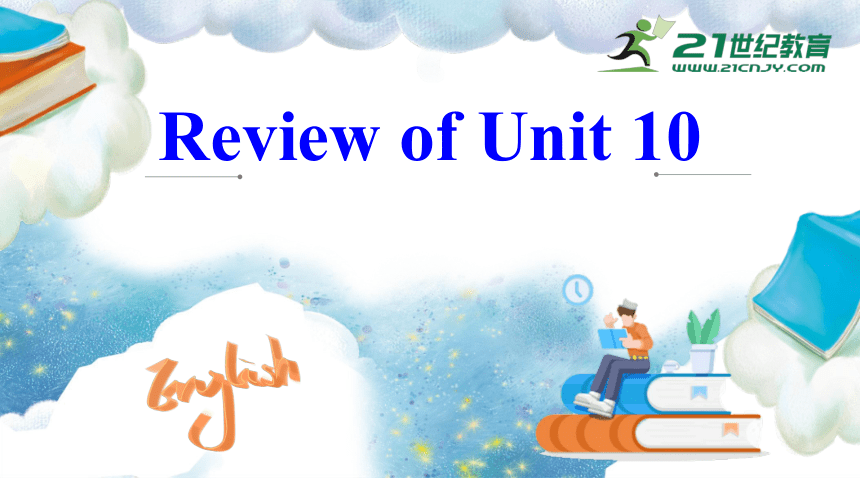
|
|
| 格式 | zip | ||
| 文件大小 | 18.2MB | ||
| 资源类型 | 试卷 | ||
| 版本资源 | 人教新目标(Go for it)版 | ||
| 科目 | 英语 | ||
| 更新时间 | 2020-12-11 00:00:00 | ||
图片预览

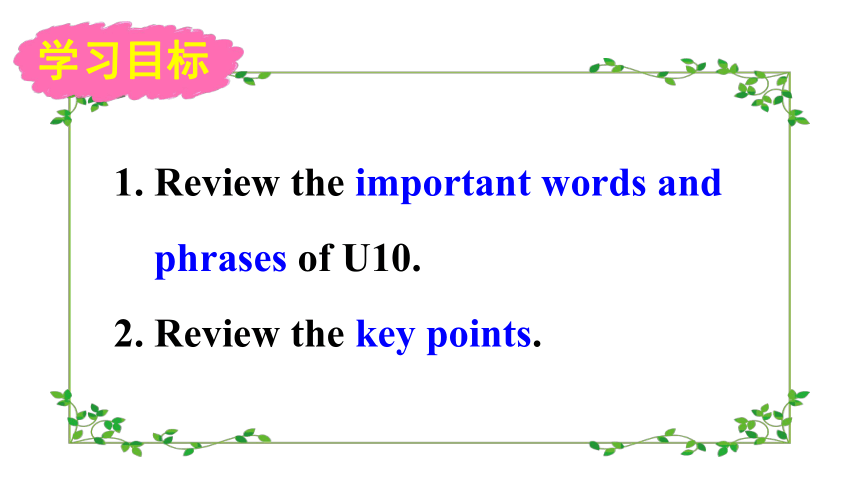
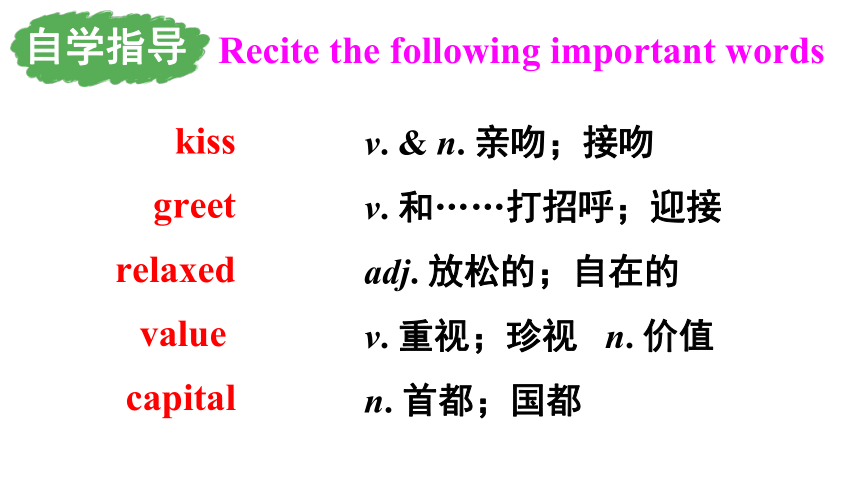
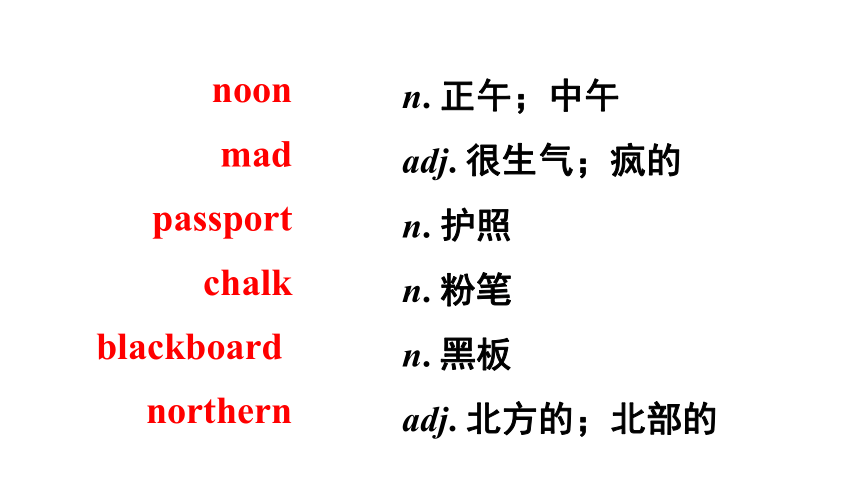
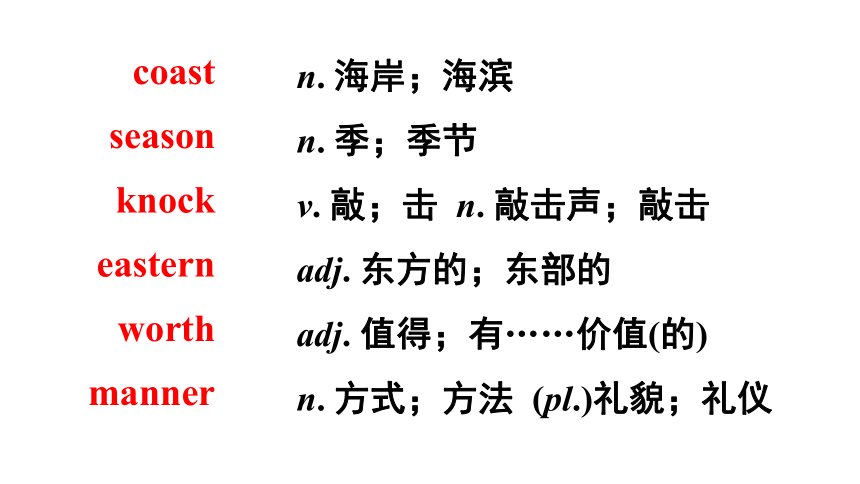
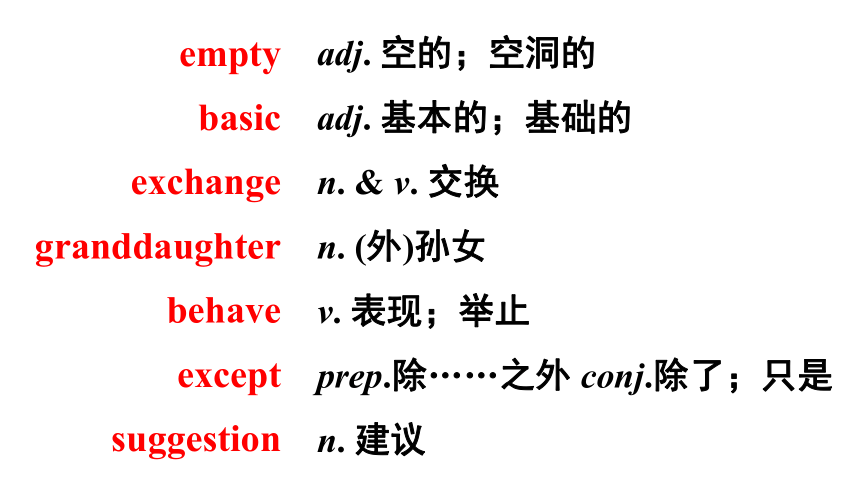
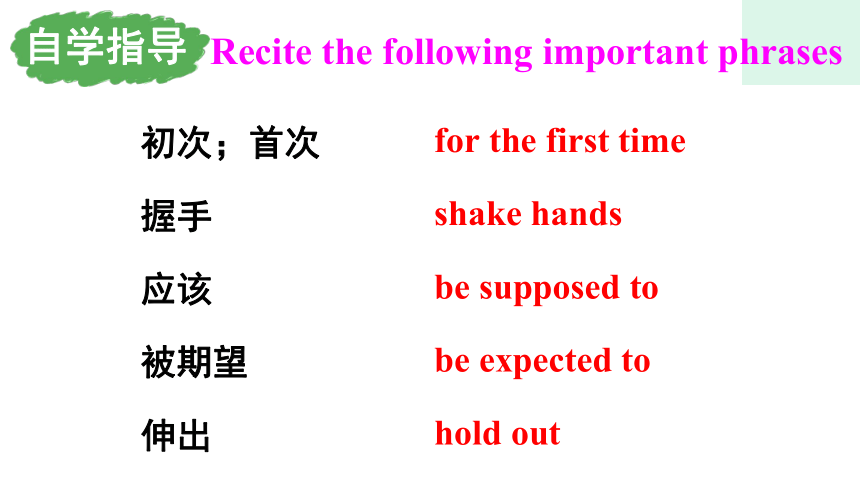
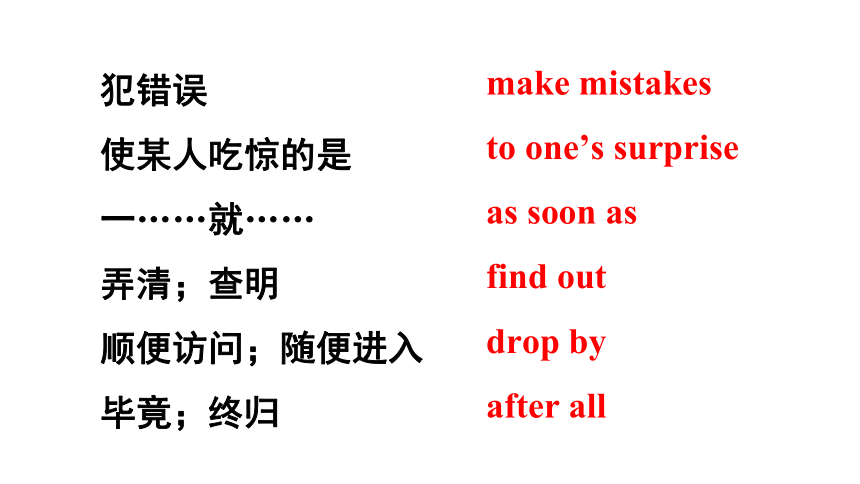
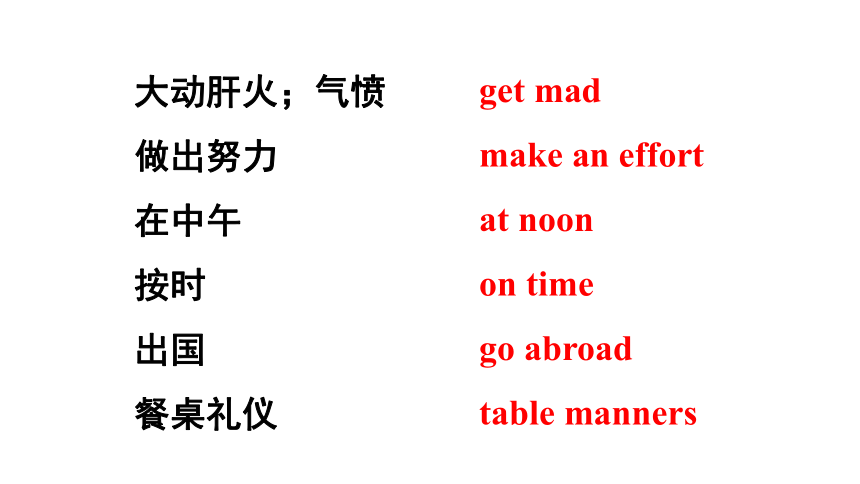
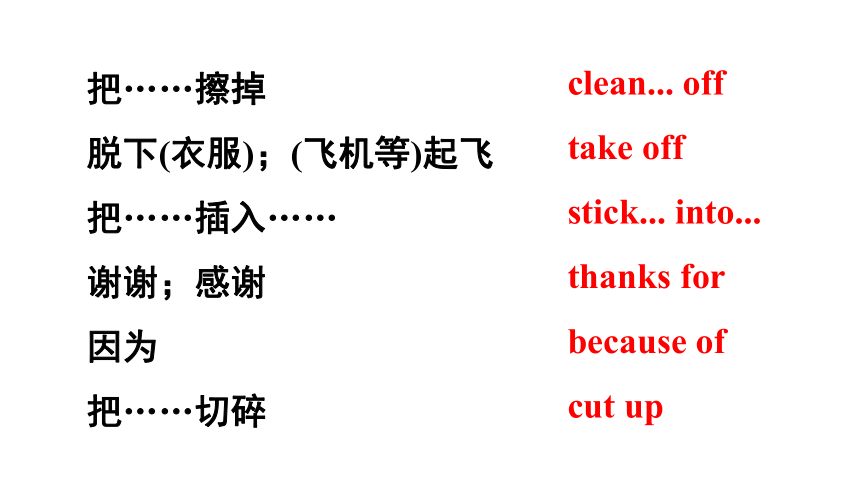
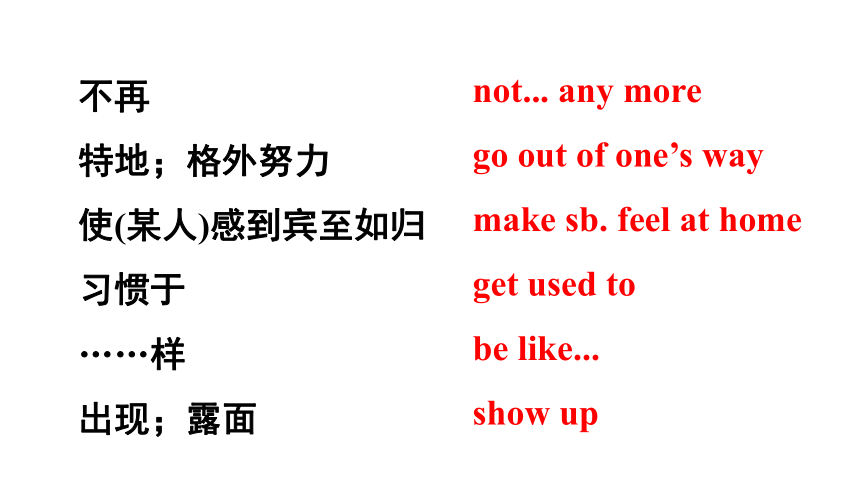
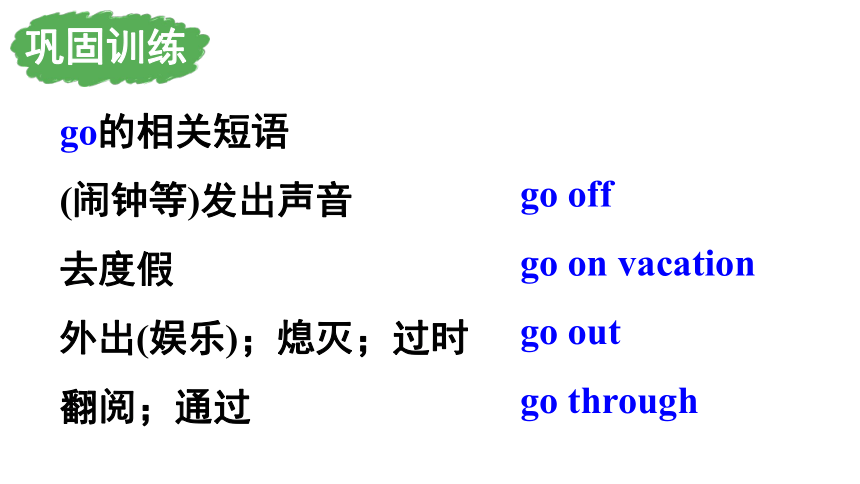
文档简介
(共40张PPT)
Review
of
Unit
10
1.
Review
the
important
words
and
phrases
of
U10.
2.
Review
the
key
points.
学习目标
自学指导
Recite
the
following
important
words
v.
&
n.
亲吻;接吻
v.
和……打招呼;迎接
adj.
放松的;自在的
v.
重视;珍视
n.
价值
n.
首都;国都
kiss
greet
relaxed
value
capital
n.
正午;中午
adj.
很生气;疯的
n.
护照
n.
粉笔
n.
黑板
adj.
北方的;北部的
noon
mad
passport
chalk
blackboard
northern
n.
海岸;海滨
n.
季;季节
v.
敲;击
n.
敲击声;敲击
adj.
东方的;东部的
adj.
值得;有……价值(的)
n.
方式;方法
(pl.)礼貌;礼仪
coast
season
knock
eastern
worth
manner
adj.
空的;空洞的
adj.
基本的;基础的
n.
&
v.
交换
n.
(外)孙女
v.
表现;举止
prep.除……之外
conj.除了;只是
n.
建议
empty
basic
exchange
granddaughter
behave
except
suggestion
初次;首次
握手
应该
被期望
伸出
for
the
first
time
shake
hands
be
supposed
to
be
expected
to
hold
out
自学指导
Recite
the
following
important
phrases
犯错误
使某人吃惊的是
一……就……
弄清;查明
顺便访问;随便进入
毕竟;终归
make
mistakes
to
one’s
surprise
as
soon
as
find
out
drop
by
after
all
大动肝火;气愤
做出努力
在中午
按时
出国
餐桌礼仪
get
mad
make
an
effort
at
noon
on
time
go
abroad
table
manners
把……擦掉
脱下(衣服);(飞机等)起飞
把……插入……
谢谢;感谢
因为
把……切碎
clean...
off
take
off
stick...
into...
thanks
for
because
of
cut
up
不再
特地;格外努力
使(某人)感到宾至如归
习惯于
……样
出现;露面
not...
any
more
go
out
of
one’s
way
make
sb.
feel
at
home
get
used
to
be
like...
show
up
go的相关短语
(闹钟等)发出声音
去度假
外出(娱乐);熄灭;过时
翻阅;通过
go?off
go?on?vacation
go?out
go?through
巩固训练
hold的相关短语
等一等(别挂电话)
cut的相关短语
砍倒
插嘴;超车;插入
切除;中断
删除;删去
cut?down
cut?in
cut?off
cut?out
hold?on
into的相关短语
转换成;把……变成
升入
把……译成
change?into
rise?into
translate...?into…
即时演练
1.
I’m
a
little
nervous
because
I
know
nothing
about
their
_________
(习俗).
2.
Don’t
_________
(
插入)
your
chopsticks
into
the
food.
It’s
not
polite.
一、根据句意及汉语提示填写单词。
customs
stick
3.
The
young
man
had
a
_________
(碗)
of
rice
and
some
vegetables
for
lunch.
4.
The
box
is
_________
(空的).
There
is
nothing
in
it.
5.
It’s
believed
that
good
_________
(礼仪)
are
important
to
everyone.
bowl
empty
manners
6.
Everyone
should
learn
_________
(基本的)
table
manners.
7.
He
will
be
an
_________
(交换)
student
in
Japan.
basic
exchange
8.
The
old
man
loves
his
______________
(孙女)
very
much.
9.
The
professor
is
very
good
at
dealing
with
___________
(青少年的)
problems.
10.
Everyone
is
here
_________
(除……以外)
Mary
because
she
is
busy
with
homework.
granddaughter
teenage
except
1.
You
are
____
to
bow
instead
of
____
in
Japan.
A.
supposed;
kiss
B.
supposing;
kissing
C.
supposed;
kissing
D.
supposing;
kiss
2.
Mr.
Zhang
has
been
off
for
vacation
for
a
week.
We
expect
him
_______
back
in
one
or
two
days.
A.
came
B.
come
C.
coming
D.
to
come
二、单项选择。
3.
—Can
you
help
me
______
when
the
first
train
to
Shanghai
will
start
tomorrow?
—Of
course.
A.
look
for
B.
take
out
C.
think
up
D.
find
out
4.
Please
give
me
a
call
_______
you
come
back.
A.
until
B.
as
soon
as
C.
while
5.
We
should
be
kind
to
our
friends
and
_______
friendship.
A.
knock
B.
value
C.
worth
D.
point
6.
It’s
getting
hot,
you
can
_______
your
coat.
A.
put
off
B.
take
off
C.
set
off
D.
get
off
1.
不要害怕犯错误,你能从中学到很多。
Don’t
be
afraid
to
_____
________.
You
will
learn
a
lot
from
them.
2.
这个暑假他第一次做饭。
During
the
summer
holiday
he
cooked
dinner
______
______
______
______.
三、根据汉语意思完成句子,每空一词。
make
mistakes
for
the
first
time
3.
使他吃惊的是,十堰近几年发生了很大变化。
______
______
__________,
Shiyan
has
changed
a
lot
in
recent
years.
4.
别责怪他,他毕竟还是个孩子。
Don’t
blame
him.
______
______,
he’s
only
a
child.
To
his
surprise
After
all
5.
今天早晨我又迟到了,所以老师大动肝火。
I
was
late
this
morning
again,
so
my
teacher
______
______.
6.
海伦切碎苹果,然后把它们放在盘子里。
Helen
______
______
the
apples
and
then
put
the
pieces
on
a
plate.
got
mad
cut
up
7.
汤姆已经习惯了法国的习俗。
Tom
has
______
______
______
the
customs
in
France.
got
used
to
语法复习
1.
be
supposed
to
do
sth.
应该做某事;被期望做某事
用来表示根据规定人们不得不做的事,或期待将要发生的事,与should/
ought
to相似,后接动词原形。
一、be
supposed
to
do的用法
2.
be
supposed
to句式变否定句时,在be动词后加not,即be
not
supposed
to
do
sth.
例如:你不应该在公共场合吸烟。
You
are
not
supposed
to
smoke
in
public
places.
3.
be
supposed
to句式变一般疑问句时,将
be动词提到主语前,即“Be
+主语+supposed
to
do
sth.?”。
例:我应该按时到吗?是的,你应该按时到。
—Am
I
supposed
to
arrive
on
time?
—Yes,
you
are.
4.
be
supposed
to句式变特殊疑问句时,在一般疑问句前加上相应的特殊疑问词。
例如:初次见到某人时,你应该做什么?
What
are
you
supposed
to
do
when
you
meet
someone
for
the
first
time?
[拓展]suppose的用法
当suppose意为“认为”时,后常接复合结构,即
suppose
sb./
sth.
to
do...
猜想/认为某人/
物……
例如:我们都认为那是一部精彩的电影。
We
all
suppose
it
to
be
a
great
movie.
二、It
is+adj.
+for/
of
sb.+to
do
sth.结构
It
is+adj.
+for/
of
sb.
+to
do
sth.
意为“对某人来说做某事……”。在此句型中,it作形式主语,不定式为真正的主语。
1.
当形容词表示事物的特征时,如:important,
difficult,
necessary
等,介词用for。
例如:对我们来说学习另外一门语言很有用。
It’s
useful
for
us
to
learn
another
language.
2.
当形容词表示人的品质时,如:clever,wise,
foolish等,介词用of。
例如:你帮助我,真是太善良了。
It’s
very
kind
of
you
to
help
me.
即时演练
1.
People
are
supposed
_______
hands
when
they
meet
for
the
first
time
in
America.
A.
shaking
B.
to
shake
C.
shake
一、单项选择。
2.
Jane
_______
to
call
me
last
night,
but
she
didn’t.
A.
supposed
B.
supposes
C.
was
supposed
D.
is
suppose
3.
—It’s
impolite
_______
you
to
stick
your
chopsticks
into
the
food.
—I’m
sorry.
I
won’t
do
that
again.
A.
for
B.
at
C.
in
D.
of
4.
—_______were
you
supposed
to
arrive?
—We
were
supposed
to
arive
at
7
:30.
A.
What
B.
When
C.
Why
D.
Where
5.
—Could
I
go
swimming
with
my
friend,
dad?
—No,
it’
s
very
dangerous
for
you
kids
_______
swimming
without
adults.
A.
go
B.
going
C.
to
go
D.
went
二、按要求完成句子。每空一词。
1.
The
concert
is
supposed
to
be
successful.
(改为
一般疑问句)
_______
the
concert
__________
____
_______
successful?
Is
supposed
to
be
2.
Jason
should
return
the
book
to
the
library
next
Tuesday.
(改为同义句)
Jason
____
__________
_______
_______
the
book
to
the
library
next
Tuesday.
3.
To
laugh
at
others
is
very
impolite.
(改为同义句)
_______
very
__________
____
laugh
at
others.
is
supposed
to
return
It’s
impolite
to
4.
The
plane
was
supposed
to
take
off
at
Shanghai
Hongqiao
International
Airport.
(对画线部分提问)
_______
______
the
plane
_________
____
take
off?
5.
The
children
are
supposed
to
study
hard
all
the
time.
(改为否定句)
The
children
_______
__________
____
_______
hard
all
the
time.
Where
was
supposed
to
aren’t
supposed
to
study
Review
of
Unit
10
1.
Review
the
important
words
and
phrases
of
U10.
2.
Review
the
key
points.
学习目标
自学指导
Recite
the
following
important
words
v.
&
n.
亲吻;接吻
v.
和……打招呼;迎接
adj.
放松的;自在的
v.
重视;珍视
n.
价值
n.
首都;国都
kiss
greet
relaxed
value
capital
n.
正午;中午
adj.
很生气;疯的
n.
护照
n.
粉笔
n.
黑板
adj.
北方的;北部的
noon
mad
passport
chalk
blackboard
northern
n.
海岸;海滨
n.
季;季节
v.
敲;击
n.
敲击声;敲击
adj.
东方的;东部的
adj.
值得;有……价值(的)
n.
方式;方法
(pl.)礼貌;礼仪
coast
season
knock
eastern
worth
manner
adj.
空的;空洞的
adj.
基本的;基础的
n.
&
v.
交换
n.
(外)孙女
v.
表现;举止
prep.除……之外
conj.除了;只是
n.
建议
empty
basic
exchange
granddaughter
behave
except
suggestion
初次;首次
握手
应该
被期望
伸出
for
the
first
time
shake
hands
be
supposed
to
be
expected
to
hold
out
自学指导
Recite
the
following
important
phrases
犯错误
使某人吃惊的是
一……就……
弄清;查明
顺便访问;随便进入
毕竟;终归
make
mistakes
to
one’s
surprise
as
soon
as
find
out
drop
by
after
all
大动肝火;气愤
做出努力
在中午
按时
出国
餐桌礼仪
get
mad
make
an
effort
at
noon
on
time
go
abroad
table
manners
把……擦掉
脱下(衣服);(飞机等)起飞
把……插入……
谢谢;感谢
因为
把……切碎
clean...
off
take
off
stick...
into...
thanks
for
because
of
cut
up
不再
特地;格外努力
使(某人)感到宾至如归
习惯于
……样
出现;露面
not...
any
more
go
out
of
one’s
way
make
sb.
feel
at
home
get
used
to
be
like...
show
up
go的相关短语
(闹钟等)发出声音
去度假
外出(娱乐);熄灭;过时
翻阅;通过
go?off
go?on?vacation
go?out
go?through
巩固训练
hold的相关短语
等一等(别挂电话)
cut的相关短语
砍倒
插嘴;超车;插入
切除;中断
删除;删去
cut?down
cut?in
cut?off
cut?out
hold?on
into的相关短语
转换成;把……变成
升入
把……译成
change?into
rise?into
translate...?into…
即时演练
1.
I’m
a
little
nervous
because
I
know
nothing
about
their
_________
(习俗).
2.
Don’t
_________
(
插入)
your
chopsticks
into
the
food.
It’s
not
polite.
一、根据句意及汉语提示填写单词。
customs
stick
3.
The
young
man
had
a
_________
(碗)
of
rice
and
some
vegetables
for
lunch.
4.
The
box
is
_________
(空的).
There
is
nothing
in
it.
5.
It’s
believed
that
good
_________
(礼仪)
are
important
to
everyone.
bowl
empty
manners
6.
Everyone
should
learn
_________
(基本的)
table
manners.
7.
He
will
be
an
_________
(交换)
student
in
Japan.
basic
exchange
8.
The
old
man
loves
his
______________
(孙女)
very
much.
9.
The
professor
is
very
good
at
dealing
with
___________
(青少年的)
problems.
10.
Everyone
is
here
_________
(除……以外)
Mary
because
she
is
busy
with
homework.
granddaughter
teenage
except
1.
You
are
____
to
bow
instead
of
____
in
Japan.
A.
supposed;
kiss
B.
supposing;
kissing
C.
supposed;
kissing
D.
supposing;
kiss
2.
Mr.
Zhang
has
been
off
for
vacation
for
a
week.
We
expect
him
_______
back
in
one
or
two
days.
A.
came
B.
come
C.
coming
D.
to
come
二、单项选择。
3.
—Can
you
help
me
______
when
the
first
train
to
Shanghai
will
start
tomorrow?
—Of
course.
A.
look
for
B.
take
out
C.
think
up
D.
find
out
4.
Please
give
me
a
call
_______
you
come
back.
A.
until
B.
as
soon
as
C.
while
5.
We
should
be
kind
to
our
friends
and
_______
friendship.
A.
knock
B.
value
C.
worth
D.
point
6.
It’s
getting
hot,
you
can
_______
your
coat.
A.
put
off
B.
take
off
C.
set
off
D.
get
off
1.
不要害怕犯错误,你能从中学到很多。
Don’t
be
afraid
to
_____
________.
You
will
learn
a
lot
from
them.
2.
这个暑假他第一次做饭。
During
the
summer
holiday
he
cooked
dinner
______
______
______
______.
三、根据汉语意思完成句子,每空一词。
make
mistakes
for
the
first
time
3.
使他吃惊的是,十堰近几年发生了很大变化。
______
______
__________,
Shiyan
has
changed
a
lot
in
recent
years.
4.
别责怪他,他毕竟还是个孩子。
Don’t
blame
him.
______
______,
he’s
only
a
child.
To
his
surprise
After
all
5.
今天早晨我又迟到了,所以老师大动肝火。
I
was
late
this
morning
again,
so
my
teacher
______
______.
6.
海伦切碎苹果,然后把它们放在盘子里。
Helen
______
______
the
apples
and
then
put
the
pieces
on
a
plate.
got
mad
cut
up
7.
汤姆已经习惯了法国的习俗。
Tom
has
______
______
______
the
customs
in
France.
got
used
to
语法复习
1.
be
supposed
to
do
sth.
应该做某事;被期望做某事
用来表示根据规定人们不得不做的事,或期待将要发生的事,与should/
ought
to相似,后接动词原形。
一、be
supposed
to
do的用法
2.
be
supposed
to句式变否定句时,在be动词后加not,即be
not
supposed
to
do
sth.
例如:你不应该在公共场合吸烟。
You
are
not
supposed
to
smoke
in
public
places.
3.
be
supposed
to句式变一般疑问句时,将
be动词提到主语前,即“Be
+主语+supposed
to
do
sth.?”。
例:我应该按时到吗?是的,你应该按时到。
—Am
I
supposed
to
arrive
on
time?
—Yes,
you
are.
4.
be
supposed
to句式变特殊疑问句时,在一般疑问句前加上相应的特殊疑问词。
例如:初次见到某人时,你应该做什么?
What
are
you
supposed
to
do
when
you
meet
someone
for
the
first
time?
[拓展]suppose的用法
当suppose意为“认为”时,后常接复合结构,即
suppose
sb./
sth.
to
do...
猜想/认为某人/
物……
例如:我们都认为那是一部精彩的电影。
We
all
suppose
it
to
be
a
great
movie.
二、It
is+adj.
+for/
of
sb.+to
do
sth.结构
It
is+adj.
+for/
of
sb.
+to
do
sth.
意为“对某人来说做某事……”。在此句型中,it作形式主语,不定式为真正的主语。
1.
当形容词表示事物的特征时,如:important,
difficult,
necessary
等,介词用for。
例如:对我们来说学习另外一门语言很有用。
It’s
useful
for
us
to
learn
another
language.
2.
当形容词表示人的品质时,如:clever,wise,
foolish等,介词用of。
例如:你帮助我,真是太善良了。
It’s
very
kind
of
you
to
help
me.
即时演练
1.
People
are
supposed
_______
hands
when
they
meet
for
the
first
time
in
America.
A.
shaking
B.
to
shake
C.
shake
一、单项选择。
2.
Jane
_______
to
call
me
last
night,
but
she
didn’t.
A.
supposed
B.
supposes
C.
was
supposed
D.
is
suppose
3.
—It’s
impolite
_______
you
to
stick
your
chopsticks
into
the
food.
—I’m
sorry.
I
won’t
do
that
again.
A.
for
B.
at
C.
in
D.
of
4.
—_______were
you
supposed
to
arrive?
—We
were
supposed
to
arive
at
7
:30.
A.
What
B.
When
C.
Why
D.
Where
5.
—Could
I
go
swimming
with
my
friend,
dad?
—No,
it’
s
very
dangerous
for
you
kids
_______
swimming
without
adults.
A.
go
B.
going
C.
to
go
D.
went
二、按要求完成句子。每空一词。
1.
The
concert
is
supposed
to
be
successful.
(改为
一般疑问句)
_______
the
concert
__________
____
_______
successful?
Is
supposed
to
be
2.
Jason
should
return
the
book
to
the
library
next
Tuesday.
(改为同义句)
Jason
____
__________
_______
_______
the
book
to
the
library
next
Tuesday.
3.
To
laugh
at
others
is
very
impolite.
(改为同义句)
_______
very
__________
____
laugh
at
others.
is
supposed
to
return
It’s
impolite
to
4.
The
plane
was
supposed
to
take
off
at
Shanghai
Hongqiao
International
Airport.
(对画线部分提问)
_______
______
the
plane
_________
____
take
off?
5.
The
children
are
supposed
to
study
hard
all
the
time.
(改为否定句)
The
children
_______
__________
____
_______
hard
all
the
time.
Where
was
supposed
to
aren’t
supposed
to
study
同课章节目录
- Unit 1 How can we become good learners.
- Section A
- Section B
- Unit 2 I think that mooncakes are delicious!
- Section A
- Section B
- Unit 3 Could you please tell me where the restroom
- Section A
- Section B
- Unit 4 I used to be afraid of the dark.
- Section A
- Section B
- Unit 5 What are the shirts made of?
- Section A
- Section B
- Review of Units 1-5
- Unit 6 When was it invented?
- Section A
- Section B
- Unit 7 Teenagers should be allowed to choose their
- Section A
- Section B
- Unit 8 It must belong to Carla.
- Section A
- Section B
- Unit 9 I like music that I can dance to.
- Section A
- Section B
- Unit 10 You're supposed to shake hands.
- Section A
- Section B
- Review of Units 6-10
- Unit 11 Sad movies make me cry.
- Section A
- Section B
- Unit 12 Life is full of the unexpected
- Section A
- Section B
- Unit 13 We're trying to save the earth!
- Section A
- Section B
- Unit 14 I remember meeting all of you in Grade 7.
- Section A
- Section B
- Review of Units 11-14
